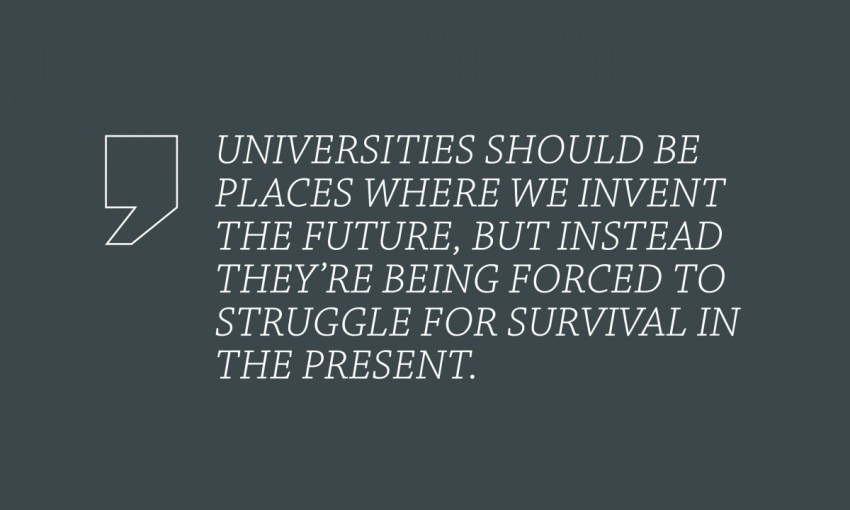There's room to argue over the detail of the Federal Government's new university reforms, but there's no arguing over the vision behind them - because there isn't one.
A+ for lack of leadership on uni reforms
Earlier this year, I spent a lot of time researching the university sector and then I wrote a very long (ohhh! how exciting, right? I know everyone ♥s long, serious stuff on the internet) article about its future.
A lot of the time, when I research something, I learn interesting new details. It’s not all that often that I learn something that changes the way I think about a topic fundamentally. But when researching universities I changed my mind about some stuff.

Farrin Foster is CityMag’s editor.
At my core I’m a bleeding heart lefty (had you noticed? It’s hardly obvious right? Ha. Ha.). Because of that, my default position is that education should be free. But, when I interviewed him, the University of Melbourne’s Dr Gwilym Croucher pointed out – very reasonably – that the payment for someone’s tertiary education should probably be based on the relative benefit to the individual and society.
“I think most people would agree there’s a huge private benefit from higher education so most students should contribute something towards their education,” he says. “Having said that, there’s obviously a limit to how much they should pay and how much a degree is really worth to them and the society in the long run.”
This excellent point, coupled with statistics that show most people are able to use their degrees to get jobs that pay much better than their counterparts without degrees, makes a good argument that perhaps uni students should be required to partially pay their own way toward their qualification.
On Monday, the Turnbull Government’s education minister Simon Birmingham announced a suite of long-awaited university reforms. Among them are plans to increase student charges for degrees, lower the repayment threshold for HECS from just over $55,000 annual salary to $42,000, and to effectively cut funding to institutions. There’s also some really good stuff around preserving and possibly even improving equitable access to university education.
So, thanks to what I learnt during my research, I’m unlikely to march in the streets to protest the changes to student fees. Sure, I think they’ve gone too far – $42,000 is a pretty low salary after all, and there are plenty of other places to look for budget boosters – but conceptually I’m not upset by the idea of students paying for degrees to some extent.
But, there is another thing I learnt while researching the university sector, and in relation to that, these reforms are a failure.
The university sector has an identity crisis.
A vast amount of change (again, for perhaps too much detail on this – see that enticingly lengthy article I wrote) to what universities do and how they do it over the last 30 years has resulted in them attempting to be all things to all people, and not doing any of the things very well as a result.
While universities struggle to work out if they’re first and foremost educators, researchers, businesses, or weird semi-government agencies, the Federal Government has decided to offer (what seems to me) an entirely reactionary, and totally financially focussed reform. Here’s a sentence from Minster Birmingham’s media release that gives you an idea of the visionary rhetoric we’re dealing with:
“These reforms mean we will have a more sustainable rate of growth in taxpayer support that’s accompanied by measures to ensure universities put the interests of students first.”
Bold, right? Endlessly inspiring.
I’m 30. My friends and I, and the generations coming after us, are looking toward a future where we face blanket automation of current jobs, no clarity around what Australia’s major industries will be, and employment that is either casualised, totally freelance, or non-existent. And that’s if we don’t all get incinerated/flooded out by the side effects of climate change.
Universities are the places where these problems could be reimagined as opportunities. But instead of offering some leadership and creating a climate in which universities are allowed to do that, this Government has put out a reform package that claws back money from the sector, asks students to pay more, increases regulation and transparency, and does pretty much nothing else.
The reforms contain no guidance, no inkling of interest in, universities’ role in shaping society. These changes just treat universities like any other industry – gouging out money where it can be gouged, and plugging up holes where things are getting leaky.
There will be, and should be, plenty of argument over the details of the package. But whether it helps the budget to repair (and there’s a whole other argument over whether the budget even needs repairing) or not, it will be a failure due to lack of imagination and leadership.
Universities should be places where we can invent the future, but this set of reforms ensures they will instead be busy struggling to stay afloat in the present.




